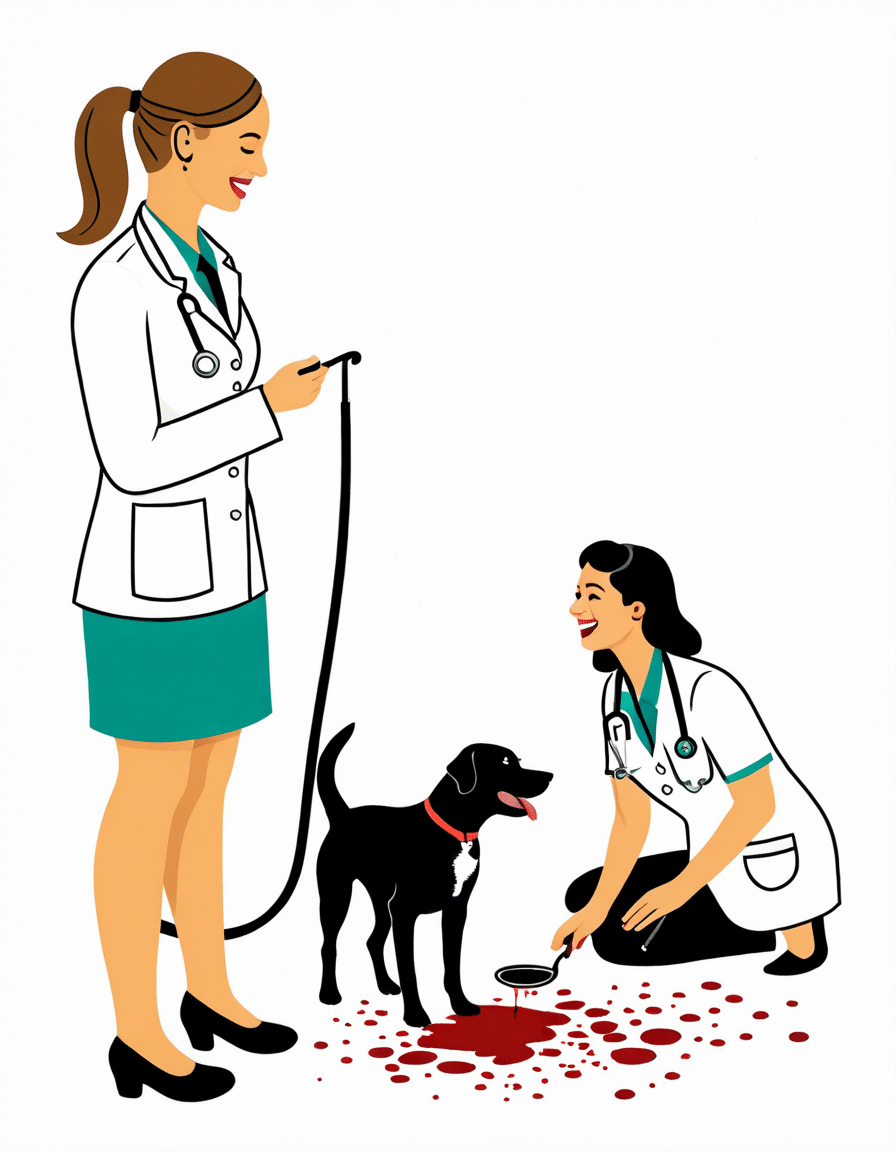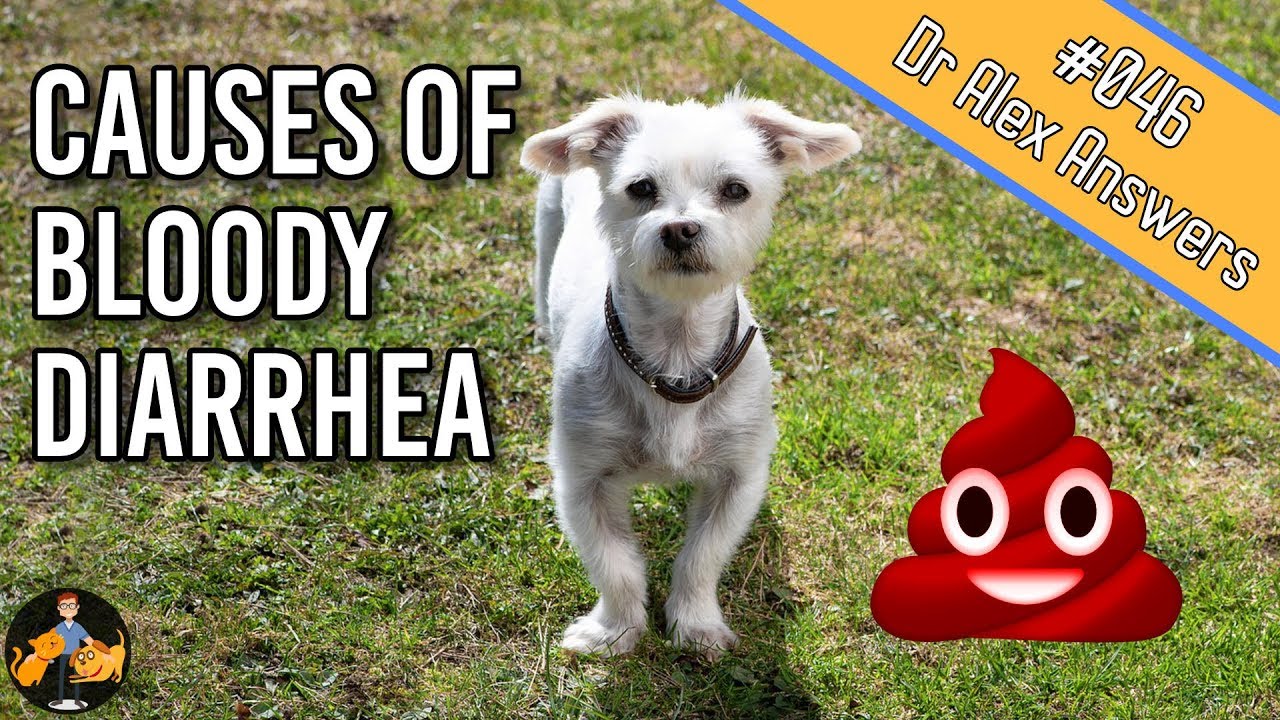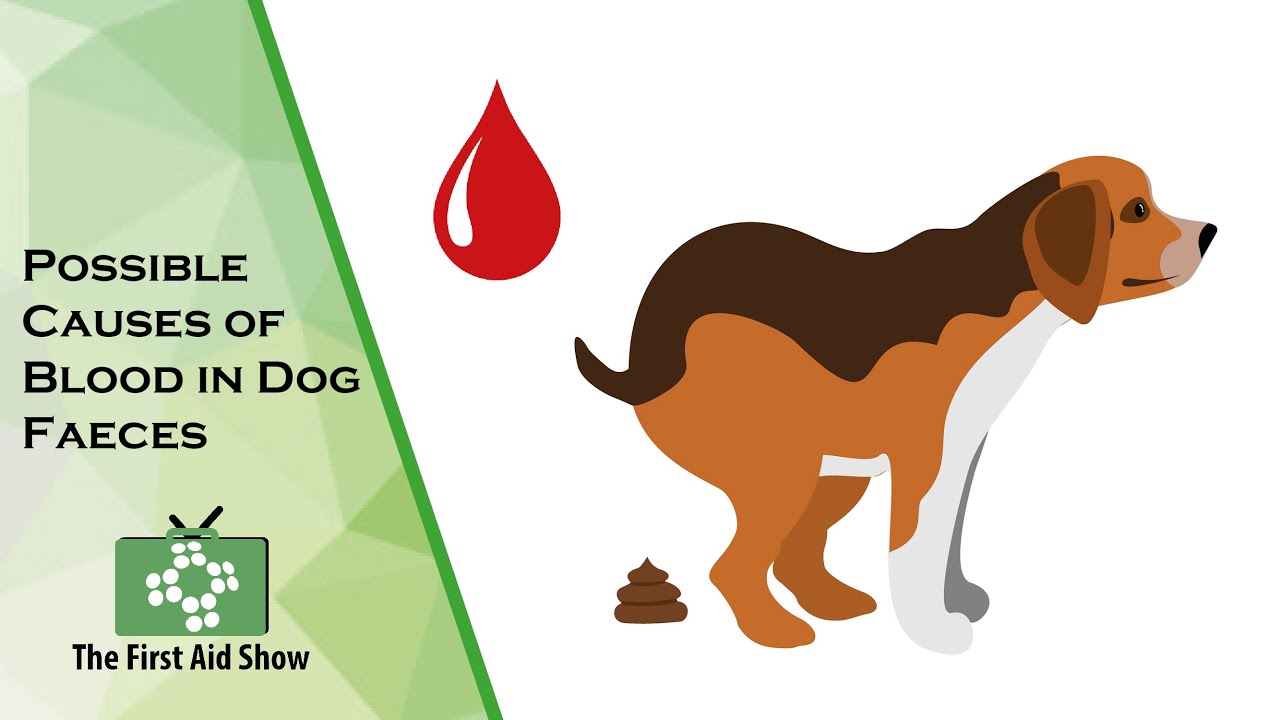Finding blood in your dog’s stool is an alarming experience for any pet owner. If you’ve ever thought, “My dog pooped blood,” you might have felt a rush of panic. It’s vital to stay calm and assess the situation because bloody stools can be a sign of various health issues, some minor and others potentially severe. Here’s what you need to know to get your furry friend the help they need.
7 Possible Reasons Why My Dog Pooped Blood
When you notice blood in your dog’s stool, knowing the potential causes can help you determine the next steps. Below are seven common reasons why your dog could be pooping blood, ranging from serious to less concerning.
1. Gastrointestinal Infections
Bacterial, viral, or parasitic infections can lead to inflammation in the intestinal tract. This inflammation often results in bloody stools. Common culprits include parvovirus, especially in puppies, and giardia, a parasite that affects dogs of all ages. For instance, little Lola, a young Beagle, contracted giardia after a romp in a contaminated stream. Staying up-to-date with vaccinations and practicing good hygiene are essential to avoid these infections.
2. Dietary Indiscretion
Dogs have a natural curiosity, and their adventurous appetites can lead to trouble. If your dog has eaten something harmful—be it spoiled food, foreign objects like toys, or even human food not suitable for pets—it may face gastrointestinal upset. An example is Daisy, a Golden Retriever, who had a rough time after munching on a discarded takeout box. Always keep an eye on what your pup eats to prevent these issues.
3. Anal Gland Problems
Full or infected anal glands can be uncomfortable for your dog and may lead to blood in their stool. Regular vet visits can help manage this issue, particularly in breeds prone to anal gland impaction. Dogs like Buddy, a Bulldog, needed assistance every few months to keep this under control. Signs include scooting or excessive licking around the rear area.
4. Inflammatory Bowel Disease (IBD)
IBD is a chronic condition affecting your dog’s gastrointestinal system. It leads to inflammation that may cause bloody diarrhea. Max, a German Shepherd diagnosed with IBD, required a special diet and regular vet visits to manage his symptoms. Early intervention is key; if you notice changes in stool consistency or frequency, it’s time to consult your vet.
5. Cancer
This may be one of the scariest possibilities, but certain cancers—like lymphoma or tumors in the gastrointestinal tract—can cause blood in your dog’s stool. Regular check-ups with the vet can help catch these issues early. Cancers like these can be treated effectively if identified sooner rather than later.
6. Hemorrhagic Gastroenteritis (HGE)
HGE is a serious condition featuring sudden onset bloody diarrhea, dehydration, and vomiting. Small breeds, such as Dachshunds, are at a higher risk. Swift veterinary treatment is crucial, as HGE can deteriorate health rapidly. Charlie, a Dachshund, bounced back from HGE after a quick trip to the vet, showcasing the importance of prompt caring.
7. Trauma
Injuries to the gastrointestinal tract, perhaps from accidents or rough play, can cause bleeding. Immediate response and diagnosis by a veterinarian are essential in these situations. If your dog has been involved in an accident, don’t ignore the signs—bloody stool could indicate serious internal damage.
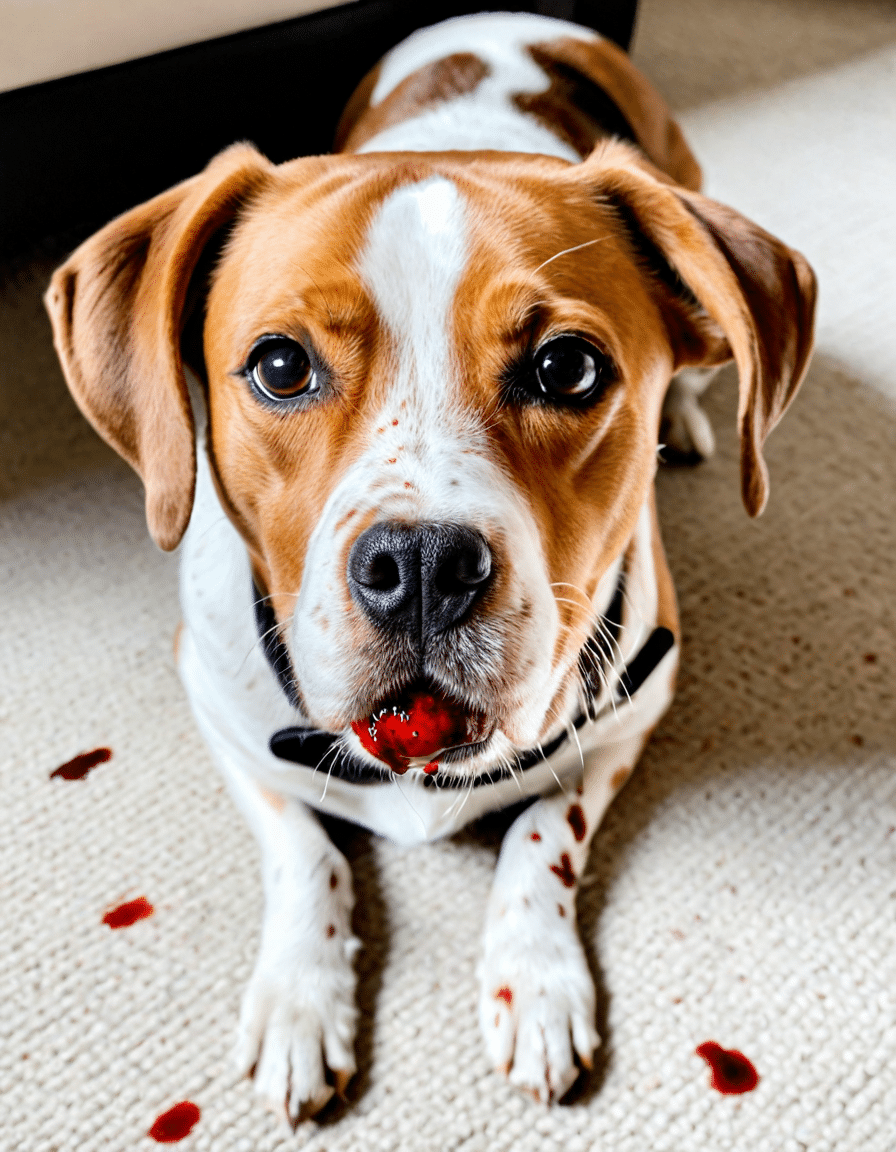
Other Health Signs: Puppy Licking Paws and Dog Licking Lips
When you see blood in your dog’s stool, be on the lookout for other signs, like “puppy licking paws a lot” or “dog licking lips a lot.” These behaviors can indicate underlying health issues.
The Link Between Behavior and Health
Dogs tend to lick their paws for various reasons, including allergies or even anxiety. If your dog exhibits bloody stool alongside constant paw licking, they could be facing an allergic reaction causing gastrointestinal upset. Similarly, excessive lip licking may signal nausea or discomfort. For example, Oliver, a small Terrier, started licking his lips consistently after he developed an upset stomach from trying a new food.
When to Consult a Vet
If your dog shows additional behaviors like paw licking or lip licking alongside bloody stool, it’s crucial to consult your veterinarian immediately. Fast action can make a significant difference in diagnosing the issue and starting appropriate treatment.
Addressing Puppy Pooping Blood: Particular Considerations for Young Dogs
Puppies are especially sensitive and vulnerable to health issues. Seeing “puppy pooping blood” can be particularly distressing, but understanding the risks can help you act promptly.
Distinctive Risks for Puppies
Young dogs are more vulnerable to infections due to their developing immune systems. Parvovirus is a significant threat to puppies and can cause severe intestinal damage. Awareness of vaccination schedules, such as completing primary vaccinations by 16 weeks, is vital for protecting young pups. Ensure your puppy is up-to-date on their shots—doing so might save their life.
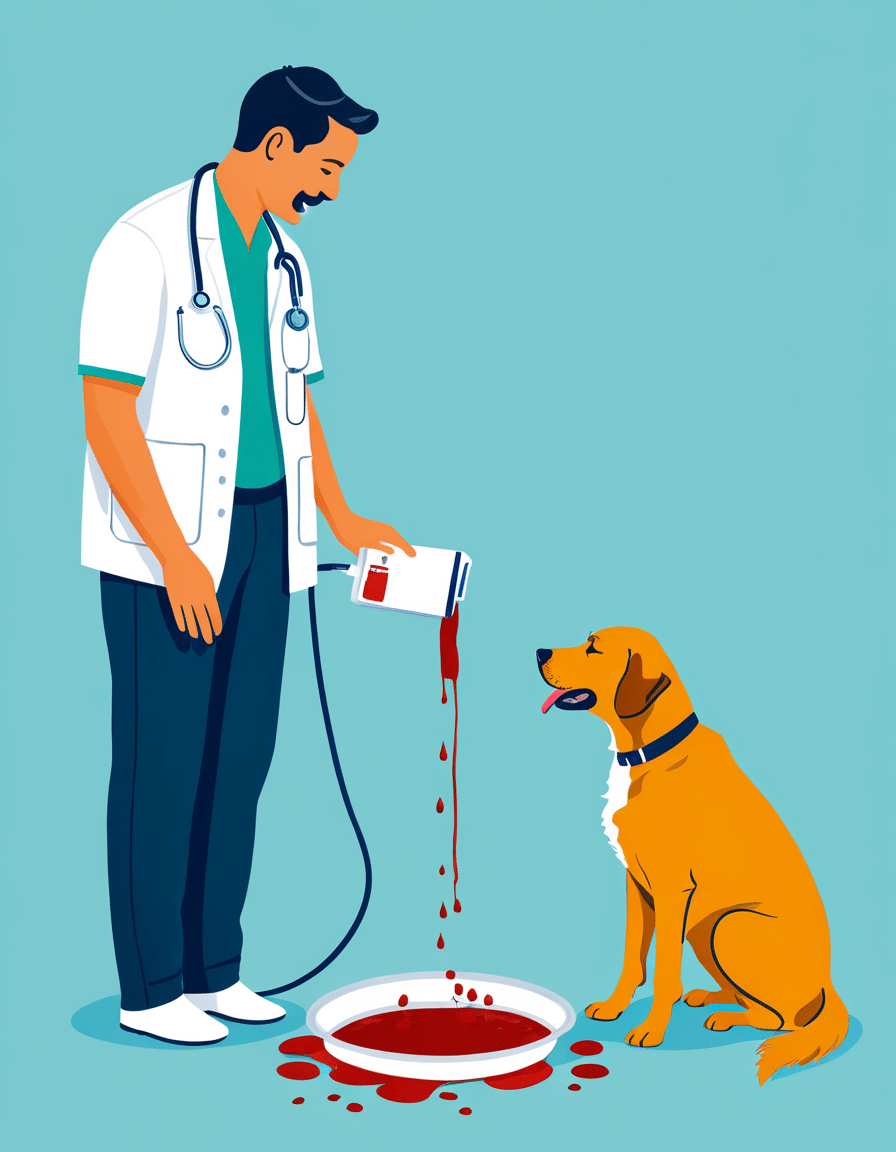
Uncommon Behaviors: The Case of a Rabbit Licking Her Own Pee
While we’re focusing on dogs, it’s essential to recognize that unusual behaviors in other pets can prompt vital health discussions. For instance, “rabbit licking her own pee” might seem odd but can indicate issues such as urinary tract infections or stress.
When to Worry about Non-Dog Pets
Understanding your pet’s normal behaviors is key to spotting changes. In your rabbit’s case, this licking behavior could be a signal that shouldn’t be ignored. Monitoring your pets’ habits across species can help ensure their overall health.
Final Thoughts: Recognizing Signs and Taking Action
Seeing blood in your dog’s stool is undoubtedly distressing. It’s a sign you must act fast and seek veterinary care. Understanding the potential causes, keeping an eye on accompanying behaviors, and making sure your pets are up-to-date on vaccinations is crucial for their health. Just like humans, early detection and intervention can significantly improve recovery outcomes for our beloved dogs. Trust your instincts; if something seems off with your pet, don’t hesitate to reach out for help. Eventually, proactive health awareness can lead to happier and healthier lives for our furry family members.
My Dog Pooped Blood: Fun Trivia and Interesting Facts
The Importance of Monitoring Dog Health
So, you find yourself in a panic realizing, “my dog pooped blood.” This alarming sight can be a genuine cause for concern. Just like a black lab mixed with hound can show significant variances in health condition due to its unique ancestry, your dog’s symptoms can stem from multiple underlying issues. It’s vital to stay alert and keep track of any changes in behavior, appetite, or stool quality—just like you’d keep tabs on your favorite reality TV couple, such as those on Cashel Love island. After all, it’s always better to know what’s going on than to be left in the dark.
Etiology of Bloody Stools
When your pup experiences this unpleasant episode, it could range from something as mild as dietary changes to severe conditions like infections or parasites. It’s worth noting that even beloved pets like a pet salamander can have their share of health woes, albeit in a different context. If your dog’s being particularly gassy or experiencing changes in their bathroom habits, consider how even the innocent-sounding variation Of puffer name may also hint at something awry. Healthy habits can be crucial to keeping your pet’s digestive system on track and preventing health emergencies.
Seeking Help
Ultimately, if you’ve noticed “my dog pooped blood,” don’t hesitate to reach out for advice—a trip to the vet is your best bet. Remember, while it’s tempting to panic, educating yourself on health signals, much like understanding all about Santa’s reindeer, can help keep your mind off worry. This incident may seem daunting, but gathering information can empower you as an owner. So the next time you find yourself in such a situation, take a deep breath and know that your vigilance is your dog’s best friend, just like a trusty shift dress in your wardrobe is sure to keep you feeling chic and comfortable.
